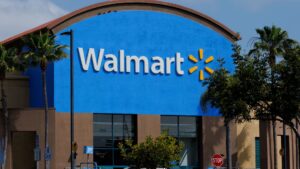Walmart’s Tariff Tango: Navigating Price Pressures in a Political Landscape
As the retail giant Walmart navigates the complex world of tariffs and trade policies, its strategic communications reveal a deeper story about consumer expectations and corporate accountability. With its massive footprint in the U.S. — where approximately 90% of the population lives within a 10-mile radius of a store — Walmart’s decisions don’t just impact its bottom line; they resonate broadly across the retail sector.
A Sudden Shift in Strategy
Last month, at a significant investor event, Walmart CEO Doug McMillon maintained a calm demeanor regarding the potential impacts of President Trump’s tariffs. He referenced past challenges, like the aftermath of 9/11, downplaying immediate risks. However, this tone recently shifted dramatically during their earnings call, where the company openly warned about price increases as a direct result of escalating import duties.
CFO John David Rainey emphasized, “We’re wired for everyday low prices, but the magnitude of these increases is more than any retailer can absorb.” This candid admission not only reflects Walmart’s operational reality but also points to a growing willingness among corporate leaders to voice concerns about governmental policies that could adversely affect consumers.
Engaging the Customer Base
Walmart’s approach is telling. They chose to inform their customers about looming price hikes instead of quietly absorbing the costs, thereby taking a stand about their obligation to transparency. A source inside the company indicated that they felt compelled to explain potential price increases to both customers and investors, signaling a deeper commitment to customer loyalty and trust.
As tariffs continue to stir uncertainty, consumer sentiment becomes paramount. According to retail analyst Michael Baker, Walmart’s communicative shift showcases their imperative to prepare consumers for upcoming changes. "They’re trying to brace the consumer for the idea that prices will go up," he said. “At some point, the math doesn’t check out.”
The Political Landscape and Corporate Accountability
Walmart’s recent remarks have not gone unnoticed in the political sphere. In a telling tweet, President Trump called on Walmart to "EAT THE TARIFFS," showcasing the precarious relationship between the retail giant and the government. Such attacks are indicative of Trump’s style; a reminder of the risks businesses face as they navigate a volatile political environment.
Joanna Piacenza from Gravity Research notes that tariffs have catalyzed a unique corporate response, allowing leaders to engage on a pertinent business issue without wading into other contentious topics. “Tariffs are really the only topic that has broken through a silent stretch of corporate engagement,” Piacenza stated, underlining the significance of this mounting debate.
A Changing Retail Landscape
As Walmart grapples with these economic realities, other retailers are also adapting their strategies in response to trade policies. Companies like Microsoft and Subaru have similarly pointed to tariffs as a reason for potential price hikes, yet contrasting statements from firms like Home Depot signal a less unified response across various sectors.
Observers are keenly watching upcoming earnings reports from major retailers, including Target and Lowe’s, for insight on pricing strategies in the face of these pressures. According to retail experts, the actions of one company can ripple through the market; retailers are working hard to monitor industry trends to avoid being caught off-guard.
Preparing for the Future
As we move forward, Walmart’s handling of the tariff situation acts as a bellwether, potentially shaping how other corporations will communicate and operate in uncertain political climates. With a loyal customer base relying on it for essential goods, Walmart’s transparency and commitment to keeping prices as low as possible in challenging times could set a new standard for corporate accountability.
As consumers become increasingly sensitive to pricing due to outside economic pressures, the relationship between corporations, government policies, and public sentiment will continue to evolve. Walmart’s proactive approach and willingness to engage directly with its customers showcase the importance of navigating these waters with clarity and purpose.
At Extreme Investor Network, we strive to keep you informed on these vital trends influencing the retail sector and their broader implications for investors. As the landscape shifts, staying ahead of these changes is crucial for strategic decision-making in your investment portfolio. Stay connected with us for more insights and analyses that empower you to make informed choices in this ever-evolving market.

